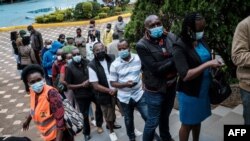Kenyan health authorities say they will not be able to give a second dose of COVID-19 vaccines until at least June, due to a shortage of AstraZeneca doses. Kenya has vaccinated less than 2 percent of its people so far, but the Ministry of Health says efforts are underway to acquire millions of doses.
Thirty-six-year-old Willkiss Ivannah helped her elderly father get vaccinated from COVID-19 in March, and now she is worried for his health.
"Now, it's May, and there is no second vaccination," Ivannah said. "We are wondering how long we will wait, and the government promised us it would give us the second vaccine. I am really worried because from my understanding, until you get the second dose of the vaccine, that’s when you will be fully safe.”
Kenya began vaccinating its population in March after getting 1 million doses of AstraZeneca vaccines from India.
So far in Kenya, 950,000 people have received the jab that gives them protection from the coronavirus.
Kenya was supposed to begin its second phase of vaccination in May. But India, which is fighting a huge wave of COVID-19 cases, has banned the exportation of vaccines.
The chairperson of Kenya’s vaccine task force, Willis Akhwale, says the lack of doses has stopped the vaccination process.
"Kenya expected to have got its shipment in April and May," Akhwale said. "We got the information that this was delayed. We were told to expect in May, and even right now in May, there is no real concrete confirmation that we are going to get them. Therefore, for us in Kenya, with this uncertainty, we decided to shift the date of the second dose from eight weeks to 12 weeks. The first people who got their jab at the beginning of March will now be due for their second dose the first week of June. So, we remain hopeful that COVAX will be in a position to deliver some doses.”
Grace Kamau, 23, a Nairobi resident, failed to get a coronavirus vaccine for herself and her 50-year-old mother.
"I was informed I could get the vaccine if I do it at a private hospital," said Kamau. "The private hospital was charging between 7,000 to 10,000 Kenya shillings. Coming from an informal settlement, and you tell me to bring 7,000 to 10,000, and that’s for one person’s dose. It is hard. I don’t have that money.”
Akhwale told Kenyans not to panic.
"The future is good. We only have this period of May and June and maybe part of early July that we may have a challenge," Akhwale said. "We want to vaccinate more people. We want to make sure all adult Kenyans are vaccinated by the end of next June. That’s our target, and we are putting systems and structures in place to ensure that immediately a steady supply of vaccines starts coming through. Then, we will do very intense mass vaccinations of Kenyans.”
Last week, Kenyan Health Minister Mutahi Kagwe said the government has ordered 30 million doses of the Johnson and Johnson vaccine. So far, Kenya has recorded 113,000 COVID-19 cases, and about 3,000 deaths.





